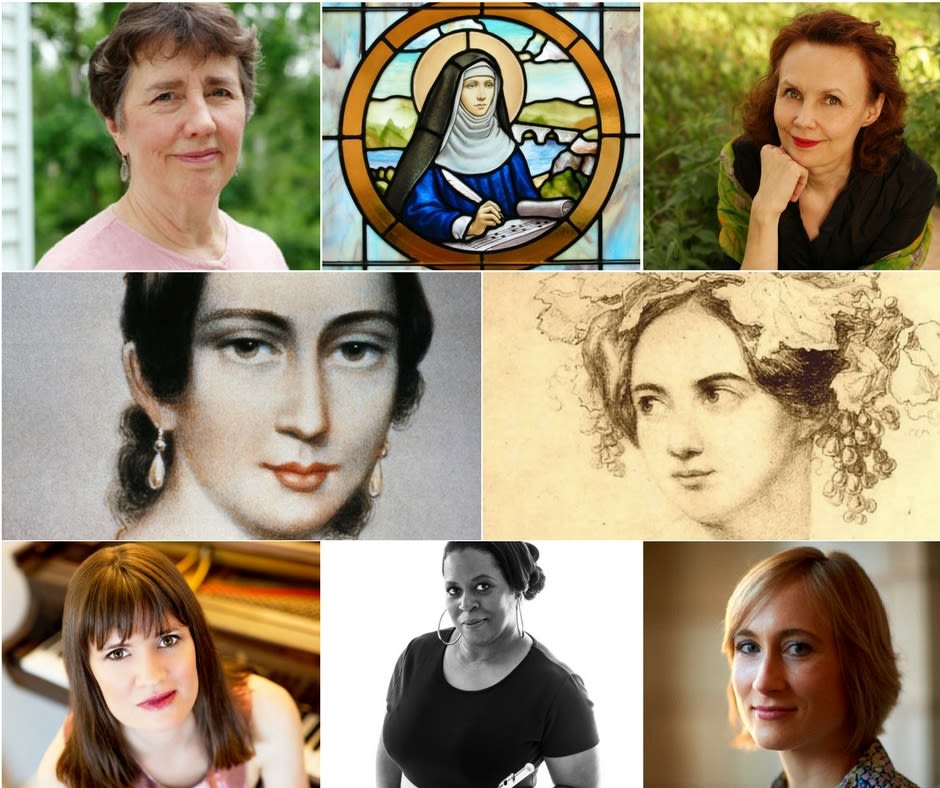Chamber Music Northwest Puts the Spotlight on Women Composers

All these women composers and more feature in this year's CMNW Summer Festival.
So you thought only stuffy male protégés in powdered wigs wrote classical music? This summer, Chamber Music Northwest challenges you to think again. CMNW’s 2017 Summer Festival highlights 22 women composers from medieval to modern times in a nod to the challenges women writing music have faced, and as a celebration of their accomplishments in a profession from which they were once shut out completely.
Performances include the premiere of new commissioned works by Kati Agócs, Hannah Lash, and Gabriella Smith (a member of CMNW’s Protégé Project), as well as Hildegard von Bingen’s 12th-century pieces, among others.
“[This is] a celebration of where we are now rather than a statement of where we should have gone or where we need to be going,” CMNW artistic director David Shifrin says. “We are recognizing the historical difficulty that women of other generations have had to endure in terms of developing their gift and celebrating in I think the best way we can—by performing lots and lots of music by women.”
Shifrin points to Fanny Mendelssohn (sister to Felix), Maria Anna Mozart (sister to Wolfgang Amadeus), and Clara Schumann (wife to Robert and mentor to Johannes Brahms) as historical examples of remarkable women composers whose now-recognized talents were ignored or stifled in favor of their male contemporaries.
Thankfully, that deep bias has been slowly changing over the years, with composers such as Ellen Taaffe Zwilich—the first occupant of the Composer's Chair at Carnegie Hall and the first woman to win the Pulitzer Prize in music—and Joan Tower, also a Pulitzer Prize winner and the first woman to receive the Grawemeyer Award, rising to the top of their fields.
“It was not a problem to find music to include in this festival, but rather a challenge to cull through all the really wonderful music that we could program and choose the representative pieces that we’re going to be hearing,” Shifrin says.
This celebration is a long time coming. The idea of programming a festival highlighting women composers was brought to his attention three years ago, Shifrin recalls, during a meeting with Alice and Michael Powell (CMNW supporters and the people behind Powell’s Books). Shifrin selected his roster based on years of listening to music, attending concerts, and gathering recommendations from colleagues and musicians.
Among the nearly two dozen women composers on CMNW’s summer schedule, Hannah Lash stands out as a writer who’s also a virtuoso harpist and performs her own music. She created and will perform one of three CMNW-commissioned pieces debuting at the festival.
“I think it’s wonderful that presenters are being much more vigilant and proactive about seeking to feature women composers,” Lash says. “I just hope that as we move forward in time, and as presenters are raising everybody’s awareness that music is being written by other people than just men, that we can be as broadly inclusive of everybody as possible.”
Lash, a professor at Yale School of Music with Shifrin, says she did not find out her commissioned piece, Form and Postlude, was part of a festival highlighting women composers until after she wrote it. Lash says she “imprinted” on classical music before gender distinction was on her radar. She recalls listening to Bach’s Cantatas, Mozart’s Violin Concertos, and Brahms’s chamber music with her father and feeling a profound bond with this music at just three years old. Learning that all these pieces were created by men didn’t change her love for the music, nor her desire to be a composer. Rather, Lash explains that what she finds most disturbing about classical music’s history of gender imbalance is how women contemporaries of now-legendary composers were not allowed to pursue music careers after marriage.
“Not only were they pushed aside, but what really struck me very deeply and painfully was that from day one of their training, they weren’t given the same…sense of emotional support,” Lash says. “The sense that there is a, if not explicit, very powerful subliminal message that this serious pursuit of music is simply not available to them in a way that it is available to men. I just can’t see any way if [a woman] is given a negative message like these women [received] that she could possibly feel unhampered in her own creativity.”
The Summer Festival begins on Monday, June 26. Hannah Lash’s Form and Postlude will debut on July 13 and she, along with several other featured composers, will be present at a discussion event the following day called “Coffee with the Composer.”
Chamber Music Northwest 2017 Summer Festival
June 26–July 30; times, venues, and prices vary
Agócs and Lash World Premieres
7:30 p.m. Thu, July 13, Kaul Auditorium at Reed College, $10–60




